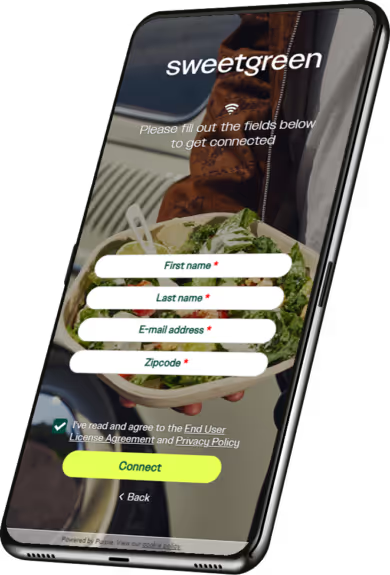Secure and Seamless Connectivity for Hospitality
The Purple App delivers passwordless, secure WiFi access for staff and customers.
- Automatic staff access revocation
- Seamless guest connectivity
- Enhanced security with WPA3

Loved by many Hospitality businesses









.avif)

Industry-leading results for Hospitality
Purple transforms connectivity, reduces support burdens, and improves user experiences.
Overcome key hospitality challenges with Purple
The Purple App addresses the unique connectivity challenges faced by High Street retailers.
Frustrated by slow guest WiFi connections?
Deliver secure, portal-free access for your customers.
Walk-in customers and event attendees enjoy seamless connectivity with WPA3 encrypted WiFi Passes. They authenticate once and connect easily on future visits.
Struggling with staff access security?
Experience passwordless, Zero Trust access for your team.
Cashiers and managers benefit from automatic access revocation synced to your directory. When employees leave, their access is revoked immediately.

Seamlessly connect with your visitors
Give your visitors the gift of quick and easy internet access with Guest WiFi for restaurants, cafés, pubs, and more, and enjoy a welcome return on your investment.
Guest WiFi for Hospitality? It equals great results.
.svg)
We are continually looking for new ways to enhance the customer experience, and Purple has helped us do just that, with the added benefit of customer insight
Choose from three Guest WiFi plans for hospitality
Say goodbye to underused features and overpriced plans. Unlock value for money with the right Guest WiFi plan for your hospitality business.
Connect
- Secure captive portal
- Branded splash pages
- 25 supported languages
- Network analytics
- Monitor speed and venue coverage
- Compliance with major data laws
Capture
- First-party data capture
- CRM integration
- Detailed WiFi analytics
- Behavioral insights
- Email address verification
- Access to our support team
Engage
- Customized access journeys
- Personalized communications
- Advanced WiFi analytics
- Full suite integrations
- Passpoint and profile authentication
- Fully managed service options
Get started with Purple
Ready to up your hospitality Guest WiFi game? Prepare yourself for success with our handy resources.












